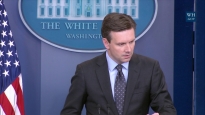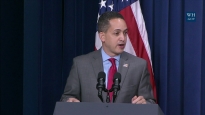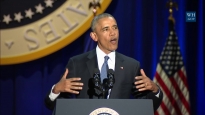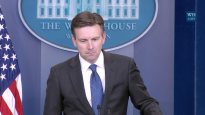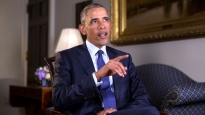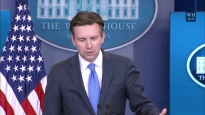Meeting with Governors on Energy Policy
February 03, 2010 | 8:57 | Public Domain
President Obama and Vice President Biden speak to a bipartisan group of governors about building a clean energy economy.
Remarks by The President and The Vice President at Meeting with Governors on Energy Policy
State Dining Room
2:06 P.M. EST
THE PRESIDENT: Well, listen, I just want to personally welcome all the governors who are here today. As I said at the State of the Union last week, I am convinced that whoever builds a clean energy economy, whoever is at the forefront of that, is going to own the 21st century global economy. Last year, we made the largest investment in clean energy in our history. It's an investment that's already leading to new jobs and new businesses across the country. You've got solar panel production in California. You got advanced batteries in North Carolina. Every state is starting to take advantage of a lot of what's already been done.
But if anybody read the story in The New York Times last Sunday, countries like China are moving even faster. And they're very aggressive about wanting to make sure that these clean energy jobs are in their countries. As I said at the State of the Union, I'm not going to settle for a situation where the United States comes in second place or third place or fourth place in what will be the most important economic engine in the future.
Now, there's no reason that we shouldn't be able to work together in a bipartisan way to get this done. I know that there is some concern about how energy fits together with climate change. I happen to believe that climate change is one of the reasons why we've got to pursue a clean energy agenda, but it's not the only reason. So even if you don't believe in the severity of climate change, as I do, you still should want to pursue this agenda. It's good for our national security and reducing our dependence on foreign oil. It's good for our economy because it will produce jobs.
We can't afford to spin our wheels while the rest of the world speeds ahead. And that's why I've asked these governors -- leaders in their own right and their states around energy issues, Democrats and Republicans –- to meet here today so that we can work through some of these challenges and opportunities that are presented by the transition to a clean energy economy.
I want to be clear that my administration is following a non-ideological approach to this issue. We believe in a strategy of more production, more efficiency, and more incentives for clean energy. We're willing to make some tough decisions on issues like offshore drilling, so long as we protect coastlines and communities. We are moving forward on a new generation of nuclear power plants, although we want to make sure that they are safe and secure.
One of the things that we're going to be talking about today is investing in the kind of technology that will allow us to use coal, our most bountiful natural resource here in the United States, without polluting our planet.
It's been said that the United States is the Saudi Arabia of coal –- and that's because, as I said, it's one of our most abundant energy resources. If we can develop the technology to capture the carbon pollution released by coal, it can create jobs and provide energy well into the future. So today I'm announcing a Carbon Capture and Storage Task Force that will be charged with the goal of figuring out how we can deploy affordable clean coal technology on a widespread scale within 10 years. And we want to get up 10 commercial demonstration projects, get those up and running by 2016.
We're also going to be talking about some developments we're making on biofuels, so that more folks can start filling up their cars and trucks with cleaner, American-grown fuels. By 2022, we will more than double the amount of biofuels we produce to 36 billion gallons, which will decrease our dependence on foreign oil by hundreds of millions of barrels per year. We're also working to make sure that we can start turning things like plants and woodchips into heat, power, and biofuels, and that will create new economic opportunities for rural communities. And our biofuels working group is releasing its first report that details the government's strategy for supporting the biofuels industry.
The bottom line is this: I am convinced that America can win the race to build a clean energy economy, but we're going to have to overcome the weight of our own politics. We have to focus not so much on those narrow areas where we disagree, but on the broad areas where we agree.
And I also think it's important for us to understand that in order for us to move forward with a robust energy policy, we've got to have not an either/or philosophy but a both/and philosophy -- a philosophy that says traditional sources of energy are going to continue to be important for a while so we've got to just use technologies to make them cleaner and more efficient; that we're going to have to pursue an energy-efficiency agenda across our economy.
We're going to also have to develop new sources of energy that allow us to take advantage of sun, wind, our coastlines, and in ways that over time can actually enhance our standards of living, create jobs, and also protect our environment.
That's the agenda I want to pursue. I am confident that's the agenda that these governors want to pursue as well. And so I'm grateful to have them here and I'm looking forward to hearing their ideas.
I should point out, obviously, that we also have our key Cabinet members here -- Steven Chu, Tom Vilsack, Ken Salazar, Lisa Jackson -- who are here as well, and Nancy Sutley at our Council of Environmental Quality, and Carol Browner, who's doing a lot of our coordination in the White House, so that we've got our top people on energy and the environment in the room to have this discussion.
Now, with that, I want to give Joe just a brief chance to speak.
THE VICE PRESIDENT: Mr. President, let me just add a few points. By the way, welcome. These poor guys, Mr. President, and women have had to listen to me on telephone calls on the Recovery Act over the last several months. I thank you for your cooperation. It's been -- I hope we've been responsive.
Well, look, the announcement you're making today, Mr. President, builds on an unprecedented investment that the federal government has made, in large part through the Recovery Act, to deal with investments in clean energy and lessen our dependence on foreign oil -- $80 billion. That has leveraged another $70 billion, Mr. President, for a total investment of $150 billion in clean energy. A little more than a third of that money is out the door, and it's already saved and created somewhere in the area of over 10,000 jobs, to go to your point about it's not just about the environment; this is a job creator.
That includes more than $3 billion in clean coal projects for West Virginia -- from West Virginia to Alabama, and $600 million in biofuels, which are on track now, Mr. President, will be placed in various states across the country here.
We're now on track to go from zero -- zero commercial-scale biofuel refineries to 19 by the year 2012, and from no commercial-scale power plants operating carbon capture to five by the year 2015.
We're putting this economy, through these governors, Mr. President, and putting this country on track to lead the world in clean coal technology which we can export -- including exporting to China, which China is building coal-powered plants at a rate of one per month -- one per month. And they need this technology to capture their emissions.
And overall, I've learned through my regular calls with all these governors, Mr. President, the best way to make the Recovery Act work for everyone is to hear from everyone, and they've made significant input to how we've managed the Recovery Act.
Again, I want to end my brief comment by thanking them and welcoming them here to the White House. And I think we have a chance to -- there used to be a Lawton Chiles, he used to be a governor, and a senator I worked with for years, and Lawton once said one day, I said, Mr. President, I said, "Lawton, why are you so excited about that bill we passed?" And I thought I missed the significance, it wasn't that big of a deal. He said, "Joe, it's so seldom in American politics when conscience and convenience cross paths, you should celebrate." (Laughter.) This is a place where conscience and convenience cross paths.
THE PRESIDENT: Let's get it done. Thank you very much, everybody.
END
2:14 P.M. EST
|
January 12, 2017
|
January 12, 2017
|
January 11, 2017
|
January 11, 2017
|
|
January 11, 2017
|
January 9, 2017
|
January 7, 2017
|
January 6, 2017
|
- &lsaquo previous
- 1
- 2
- 3
- 4
- 5
- 6
- 7
- 8
- 9
- …
- next &rsaquo

